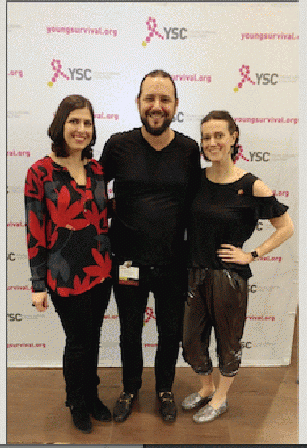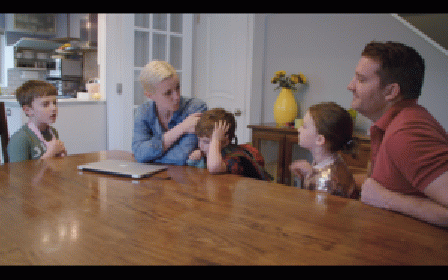JB: It sounds like it's becoming a calling for him. What kind of response have you gotten for this film, both from the general public and, specifically, from cancer survivors?
RP: The response has been tremendous, greater than I ever could have imagined. It's been shown to audiences ranging from oncologists and other physicians, to medical students, to survivors and their loved ones. I could not have predicted how much the film would be embraced by the medical community. I think that so often, the discussion post-diagnosis revolves around recurrence rate, medications and side effects, and other things that are - and should be - key components of a doctor's purview. This is not to say that doctors don't address the psychological impact, because good doctors do. But I think the film really serves as a reminder to the medical community that patients have lives outside the clinic, and that cancer's impact extends well beyond a person's medical chart.
Last week, we presented the film at the Young Survival Coalition Summit in Orlando, FL. It was incredibly powerful to see the audience's reaction and hear how much they identified with moments in the film. Seeing the film validated their experiences as survivors, and sharing the film with them validates my own experience, both as a survivor and as a filmmaker who believes this work can truly have a strong impact in the world.

Rachel, David, and Grace after a screening at the Young Survival Coalition National Summit in Orlando, February, 2018
(Image by courtesy of Rachel Pikelny) Details DMCA
JB: How has the film affected Grace, its subject? Were she and her family pleased with the way it came out? Clearly, they played a role in this, too.
To be honest, I'm not totally sure how the film has affected Grace. I know that she's grateful to have it as a record, as documentation of a very important time in her life. And I know that it has thrust her into somewhat of an advocacy position in the survivor community, a role that first began when she started writing her blog, Grancer .
It was so gratifying to sit with Grace and her family as they watched the film for the first time. They do think it's an accurate depiction of what happened, warts and all. And Grace's kids think they're movie stars now!
JB: Now what? Since this project clearly chose you, do you mind that it has also thrust you more in front of the camera, figuratively speaking, than before?
RP: You know, I don't really feel like it's thrust me in front of the camera. It was a deliberate choice to have my voice off-screen in the film - and only in a few scenes, asking questions. It's funny because as a child, I loved being the center of attention! I was always on stage, singing and dancing. And I majored in broadcast journalism in college, though I was much more interested in learning to write and shoot and edit than I was in sitting at the anchor desk, reading copy. As I got older, I started to realize that the part I enjoy most is the process of creating. So, I don't expect to be in front of the camera anytime soon.
I did enjoy directing the film, while most times, I'm playing the role of producer (though I actually produced Grace, too). In the middle of making the film, I had a short-lived identity crisis, feeling like I had to choose my path as director or producer. I don't feel that way anymore. I still very much identify as a producer but would love to direct another film when the timing and topic align.
Making this film has also reminded me how important it is to feel a connection to the subject matter. This one is incredibly personal for me, but others resonate in a different way, based on my values and life experience. I think every filmmaker needs to feel that type of ownership or identification with the story. Without it, it feels like someone else's story to tell.
JB: Well put. I'm curious and I bet our readers are wondering, too. If it's not too intrusive to ask, did doing this film make you consider getting a tattoo yourself?
RP: I consider the film my version of a tattoo. It's my way of retaking control and making sense of my own experience as a cancer survivor.
JB: That works for me. What would you like to add before we wrap this up?
RP: I think that pretty much covers it. Thanks so much, Joan!
(Note: You can view every article as one long page if you sign up as an Advocate Member, or higher).






